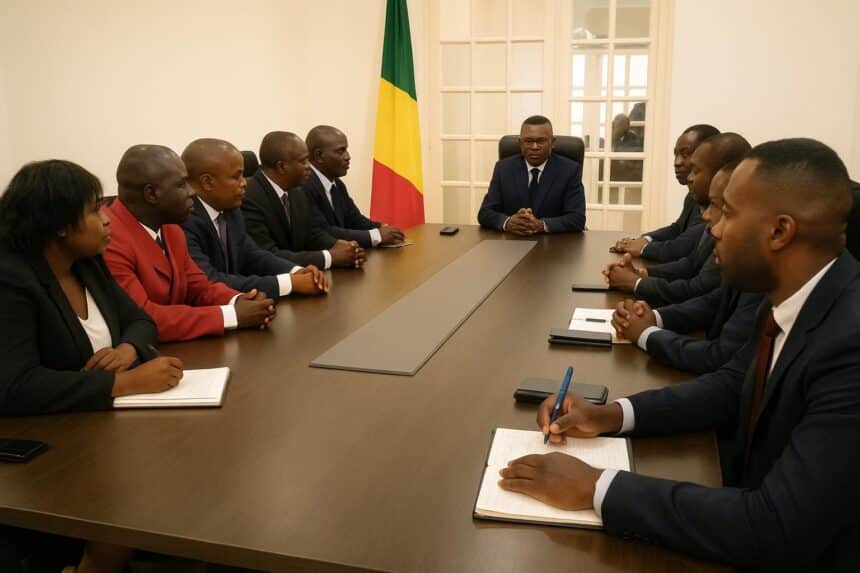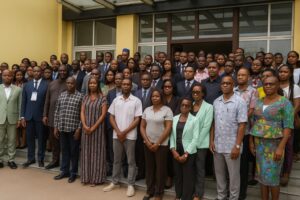Strike threat lifted at the school gate
Classrooms across Brazzaville and Pointe-Noire reopened under calmer skies this week. The National Education Union Platform, better known by its French acronym PSEN, has suspended the work stoppage it threatened for the start of the 2025-2026 school year after last-minute mediation talks.
- Strike threat lifted at the school gate
- Mediator promises hands-on follow-up
- Core grievances still on the table
- Progress varies between sub-sectors
- Families breathe easier—for now
- Teachers temper optimism with caution
- Government signals willingness to engage
- Timeline to monitor
- Congo’s classrooms resume the lesson
On 17 October, union leaders emerged from a three-hour meeting with the mediator of the Republic, Valère Gabriel Eteka-Yemet, describing the exchange as “fruitful”. Within hours they circulated a note instructing teachers to remain at their posts, citing the welfare of pupils during this pivotal exam year.
Mediator promises hands-on follow-up
Valère Gabriel Eteka-Yemet told reporters he would personally relay the educators’ concerns to key ministers, from Finance to Public Service, as well as the Prime Minister’s office. “Restoring hope for our teachers is restoring hope for the nation’s children,” he affirmed in the corridor afterwards.
His pledge aligns with the mediator’s constitutional mission to ease social tension. For PSEN spokesperson Herbin Baketiba, the commitment represents “a credible path toward a peaceful resolution before the presidential election cycle”, a moment when stability in public services is viewed as essential.
Core grievances still on the table
Despite the truce, teachers insist that the fundamentals remain unchanged. They want full payment of salary arrears, publication of the joint decree setting the levels of new bonuses, and the long-awaited convening of parity commissions that validate promotions and postings.
Three additional points fuel the urgency: raising the salary index to 450 by 1 December 2025, restoring family allowances trimmed years ago, and expanding the annual integration quota to 4,000 posts so contract teachers can gain civil-service status.
Progress varies between sub-sectors
The Ministry of General Education has already held its parity commission, and the decrees are said to be in the signature phase. Union officials applaud that progress yet point to the silence coming from the Ministry of Technical and Vocational Training, where no similar meeting has been scheduled.
This imbalance explains why PSEN insists that the mediator speak to each portfolio minister individually. “Technical schools feed our economy; their teachers deserve equal treatment,” Baketiba stressed after the meeting, adding that members expect harmonised timelines.
Families breathe easier—for now
Parents in the Moungali district, interviewed outside Collège Nganga-Edouard, voiced relief. “We had already organised study groups at home in case of a shutdown,” said mother of two Mireille Makosso. “Now we can focus on exam registration fees instead of transport for private tutoring.”
Taxi drivers also report steadier morning traffic thanks to the return of school runs, a boon at a time when fuel prices weigh on household budgets. The social calm echoes the mediator’s call for “collective responsibility” while negotiations continue behind closed doors.
Teachers temper optimism with caution
Physics teacher Jean-Marc Okemba says the mood in staff rooms is hopeful yet guarded. “We have seen promises before,” he notes, remembering past memoranda that stalled. His colleague Léonie Mavoungou adds that the union’s one-month review clause keeps pressure on all parties to deliver.
PSEN confirms it will reconvene in mid-November to assess progress. If concrete steps are missing, leaders reserve the right to reactivate strike notices, though they emphasise dialogue as the preferred route.
Government signals willingness to engage
While no official communiqué was released after the talks, sources close to the Ministry of Finance say technical teams are reassessing the backlog of salary adjustments. Analysts see the mediator’s entry as a sign of high-level attention aimed at preventing disruptions during the electoral calendar.
Public-service observers point out that fulfilling arrears would inject disposable income into local markets, supporting small businesses as year-end festivities approach. The political upside for the government lies in visibly safeguarding classroom stability.
Timeline to monitor
Key dates now dominate union diaries. By late October, educators expect an initial briefing from ministerial cabinets. Early November should deliver the draft decree on bonuses, while parity commission rulings are slated for publication before exam registrations close.
The decisive milestone is mid-November, when PSEN returns to its grassroots membership. Successful milestones could anchor a durable peace in schools; missed targets may reopen the debate, a scenario stakeholders hope to avoid.
Congo’s classrooms resume the lesson
For pupils, the immediate outcome is simple: teachers are present, syllabi advance and the school bell rings on schedule. For administrators, attention shifts to timetables lost during the September stand-by period, with remedial sessions planned to cover essential chapters.
As chalk dust settles, the broader storyline remains in flux. Yet the mediator’s intervention and PSEN’s gesture of goodwill offer a breathing space in which constructive solutions may emerge. In the words of one veteran headmaster, “When dialogue wins, everyone learns.”






















